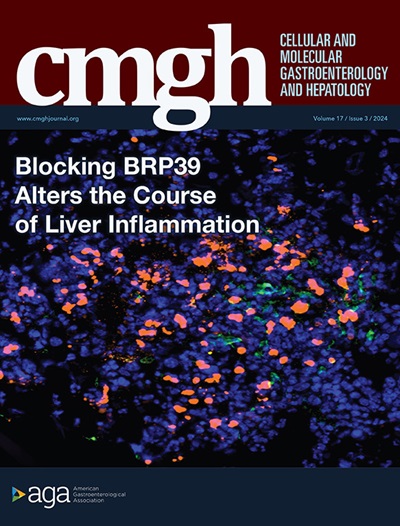Hepatitis B Virus-KMT2B Integration Drives Hepatic Oncogenic Processes in a Human Gene-edited Induced Pluripotent Stem Cells-derived Model
IF 7.1
1区 医学
Q1 GASTROENTEROLOGY & HEPATOLOGY
Cellular and Molecular Gastroenterology and Hepatology
Pub Date : 2025-01-01
DOI:10.1016/j.jcmgh.2024.101422
引用次数: 0
Abstract
Background & Aims
Hepatitis B virus (HBV)-DNA integration into the host genome contributes to hepatocellular carcinoma (HCC) development. KMT2B is the second most frequent locus of HBV-DNA integration in HCC; however, its role and function remain unclear. We aimed to clarify the impact of HBV-KMT2B integration in HCC development using a human genome-edited induced pluripotent stem cell (iPSCs) model.
Methods
Based on the genetic information on HBV-KMT2B integration in HCC, we determined its complete DNA sequence and transcript variants. To exclude the effect of other oncogenic mutations, we reproduced HBV integration in healthy donor iPSCs with an intact genome and analyzed its effects using iPSC-derived hepatic progenitor cells (HPCs) and hepatocytes (iPS-Heps).
Results
The reproduced HBV-KMT2B integration significantly upregulated the proliferation of hepatic cells. Comprehensive transcriptional and epigenetic analyses revealed enhanced expression of cell cycle-related genes in hepatic cells with HBV-KMT2B integration based on perturbation of histone 3 lysine 4 tri-methylation (H3K4me3), mimicking that in the original HCC sample. Long-read RNA-sequence detected the common KMT2B transcript variants in the HCC sample and HPCs. Overexpression of the truncated variant significantly enhanced proliferation of hepatic cells, whereas HBV-KMT2B fusion transcripts did not enhance proliferation. HBV-KMT2B-integrated HPCs exhibited replication stress and DNA damage, indicating that our model initiated the process of hepatocarcinogenesis due to abnormally promoted KMT2B function.
Conclusions
Our disease model using genetically engineered iPSCs provides the first insight into both the KMT2B function in HCC development and the oncogenic processes by HBV-KMT2B integration. We clarified the novel oncogenic mechanism in HBV-related HCC due to aberrant KMT2B function.

在人类基因编辑 iPSC 衍生模型中,HBV-KMT2B 整合驱动肝脏致癌过程。
背景与目的:乙型肝炎病毒(HBV)DNA整合到宿主基因组中会导致肝细胞癌(HCC)的发生。KMT2B 是 HBV-DNA 整合在 HCC 中的第二大常见位点,但其作用和功能仍不清楚。我们的目的是利用人类基因组编辑的诱导多能干细胞(iPSCs)模型来阐明 HBV-KMT2B 整合在 HCC 发育中的影响:方法:根据HBV-KMT2B在HCC中整合的基因信息,我们确定了其完整的DNA序列和转录本变异。为了排除其他致癌突变的影响,我们在基因组完整的健康供体 iPSCs 中复制了 HBV 整合,并使用 iPSC 衍生的肝祖细胞(HPCs)和肝细胞(iPS-Heps)分析了其影响:结果:再现的 HBV-KMT2B 整合能显著提高肝细胞的增殖。综合转录和表观遗传学分析表明,基于组蛋白 3 赖氨酸 4 三甲基化(H3K4me3)的扰动,HBV-KMT2B 整合的肝细胞中细胞周期相关基因的表达增强,与原始 HCC 样本中的表达相似。长读 RNA 序列检测了 HCC 样本和 HPCs 中常见的 KMT2B 转录本变异。截短变体的过表达会显著增强肝细胞的增殖,而 HBV-KMT2B 融合转录本不会增强增殖。整合了HBV-KMT2B的HPC表现出复制应激和DNA损伤,表明我们的模型由于KMT2B功能的异常促进而启动了肝癌的发生过程:我们利用基因工程 iPSCs 建立的疾病模型首次揭示了 KMT2B 在 HCC 发育中的功能以及 HBV-KMT2B 整合的致癌过程。我们阐明了因 KMT2B 功能异常而导致的 HBV 相关 HCC 的新型致癌机制。
本文章由计算机程序翻译,如有差异,请以英文原文为准。
求助全文
约1分钟内获得全文
求助全文
来源期刊

Cellular and Molecular Gastroenterology and Hepatology
Medicine-Gastroenterology
CiteScore
13.00
自引率
2.80%
发文量
246
审稿时长
42 days
期刊介绍:
"Cell and Molecular Gastroenterology and Hepatology (CMGH)" is a journal dedicated to advancing the understanding of digestive biology through impactful research that spans the spectrum of normal gastrointestinal, hepatic, and pancreatic functions, as well as their pathologies. The journal's mission is to publish high-quality, hypothesis-driven studies that offer mechanistic novelty and are methodologically robust, covering a wide range of themes in gastroenterology, hepatology, and pancreatology.
CMGH reports on the latest scientific advances in cell biology, immunology, physiology, microbiology, genetics, and neurobiology related to gastrointestinal, hepatobiliary, and pancreatic health and disease. The research published in CMGH is designed to address significant questions in the field, utilizing a variety of experimental approaches, including in vitro models, patient-derived tissues or cells, and animal models. This multifaceted approach enables the journal to contribute to both fundamental discoveries and their translation into clinical applications, ultimately aiming to improve patient care and treatment outcomes in digestive health.
 求助内容:
求助内容: 应助结果提醒方式:
应助结果提醒方式:


